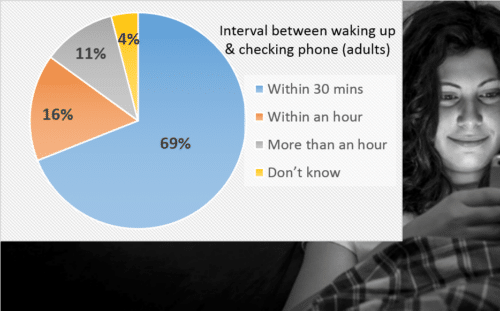How your smartphone is changing you
This morning you got out of bed and shortly afterwards checked your smartphone – in fact you looked at it within 30 minutes of waking up. Then during the day you checked your phone every hour – but more likely much more often. Don’t believe me? Well you might be the exception but those are typical figures across surveys including this one from telecoms regulator Ofcom.
Whether we’re out with friends, sitting on a train, waiting for the dentist, or (dare I say it) sitting on the toilet, it seems the old pursuit of spending time doing nothing has all but gone.
69% of us check our phones within 30 minutes of waking up — Source Ofcom 2015
Technology gives and takes away
The advantages of mobile technology are huge and increasing, but our internet phones also create side-effects.
First, we are losing the ability to “know stuff”. We don’t necessarily KNOW anything, we just know where to look. In his book Flickering Pixels, Shane Hipps states how we have become skimmers: “our intellects are spread a mile wide and an inch deep”. Topics as different as Justin Bieber or how to lose belly fat are at our fingertips but our ability to properly engage with information is disappearing. Peter Philips, working in Digital Theology at Durham University recently told me “we are becoming reliant on the internet for outsourcing our memory. We no longer remember things, we just know where to look for them”.
Secondly, we become conditioned to expect things immediately. When we click we are no longer prepared to wait. People will now abandon a web page or a video on their phone if it doesn’t load within 6 seconds. Who decided that 6 seconds was too long to wait for a page of news, or a trailer for a film? Well we all did, but a little at a time, so we didn’t really notice.
A number of authors have concluded that we are losing the ability to think deeply and rest properly.
Technology is becoming invisible
People suggest that our online behaviour changes the way we behave offline. In other words technology conditions us to always expect stimulation, to be intolerant of delays etc in real life. This is probably true but the issue is deeper than that. I think there is no longer a separation between online and offline. Mobile technology has become so good at what it does, so seamless and ever-present, we use it without thinking, sometimes without even knowing. Taking photographs, finding directions, listening to music and reading our Bibles– these are all worthwhile activities where the technology (the device) has become so good that we are oblivious to it. And when technology becomes that seamless, that familiar, it becomes part of us.
So with our phones glued on, we are alerted and interrupted throughout the day but we don’t view this with any concern. These interruptions just happen, and it’s common to see people using phones say at a restaurant rather than connecting with the people they are actually with.
The mobile-phone designed to help us talk is the reason we talk less.
Are you “always reachable” ….. why?
In their book The Hyperlinked Life the authors report that three quarters of church going adults feel overwhelmed by the information they need to stay up to date. I am no shining example but I did recently refrain from buying an Apple Watch. I am a gadget-geek so for me it was tough to go for a dumb fitness-tracker instead. My reason for avoiding the watch is that I’m not yet ready for my wrist to go into a spasm every time someone sends me a text or email. With my phone, at least I can put the thing down sometimes. Information overload is a challenge.
Some theologians say that as a worldwide medium the internet is a “new tower of Babel”. Others discuss the internet as one of Paul’s “powers and principalities”. It may be so, but here it’s enough just to say that as Christians we should not be mastered by anything of this world. Of course technology has many positives, it’s fun to find out things and stay in touch, but those things that master us tend to sneak up on us!
The authors suggest we need to “hit the reset button and recalibrate” how to live in a new and complex culture:
- At mealtimes keep phones away, or try making a “phone stack” – switch to silent and pile your phones at one end of the table. Just leave them there, even if those pings, rings and vibrates still find a way out.
- Occasionally live life in airplane mode — create moments and places during the day and during the week where there is stillness and nourishing rest. Hey you can still find places in the country where there is simply no signal.
- Rethink your motives – are we simply pinging replies, counting likes, and viewing retweets for the buzz of seeing how “popular” we are?
This is difficult. Probably more difficult than say cutting down on sugar or alcohol. The internet has entered every aspect of our lives and frankly we need it. But ultimately God whispers to us to find him in the stillness.
…Alternatively, if you find this all too difficult, you can always book a weekend at this luxury hotel. Each room has a signal-blocking grid and a magic button by the bed. Push to kill the internet.
If you enjoyed this post try reading Are You Constantly Hurried?
This blog was also published by Premier Christianity and the Baptist Times
This blog is part of a series on technology and faith — Technology Gives and Takes Away. Try reading Thou Shalt Be Disrupted.





[…] Christianity.org.uk provides a summary of Christian beliefs This blog is part of a series on technology and faith – Technology Gives and Takes Away. Try reading How your smartphone is changing you […]
Chris, at a recent church service our minister is interrupted in his sermon by someone’s phone ringing. While he smiled, the disturbance is not appreciated. I found it upsetting and inconsiderate. Then, while Karen and I are eating out many times someone’s cell phone rings. It’s so tough to get away from these annoyances in our lives. In churches and in restaurants cell phones should be put on silent. If necessary you can always text the person back without disturbing others. There is just far too much noise around us. How much we all need to feel the stillness of… Read more »
Yup – pretty much agree with all of that Kevin! And they are all common experiences too. Thanks for commenting.
Interesting perspective Chris. However, my sense is that smartphones and technology are accentuating the way we are already predisposed. The key is to be intentional and not just get carried away by what is latest and loudest — which is unfortunately what most people do. Technology just makes that worse and so forces us to decide on our priorities. If we can make the technology our slave then the possibilities are endless, but if we do not do that then it causes all the problems you mention.
Maybe .…. do mobile gadgets just make us more of what we were anyway, or do they create completely new possibilities? I would say that being connected 24x7 as some people are is new. I agree we need to make sure technology is serving us and not the other way round but I wonder how many of us can honestly say we are not somehow beholden to or dependent on technology? Thanks for the comments!
Technology, like phones, are a tool just like a calculator. I can remember in grade school the same being said about calculators, that they would degrade our ability to memorize simple multiplication tables. I dare say I would have flunked Physics without one! That said, anything can become addictive to the point it takes away quality time with our families, ability to perform our jobs, and even be sociable. Like all things, moderation and appropriate settings are key to using tools.
Thanks Patrick. I agree to a point. Yes technology is a tool, but our tools shape us and therefore change us. Technology tools make certain tasks easier (and therefore we do them more often — like say sending a message to someone instead of a letter). And technology tools introduce completely new tasks which we never thought of before (like updating social media). Agree with your point on moderation too of course.